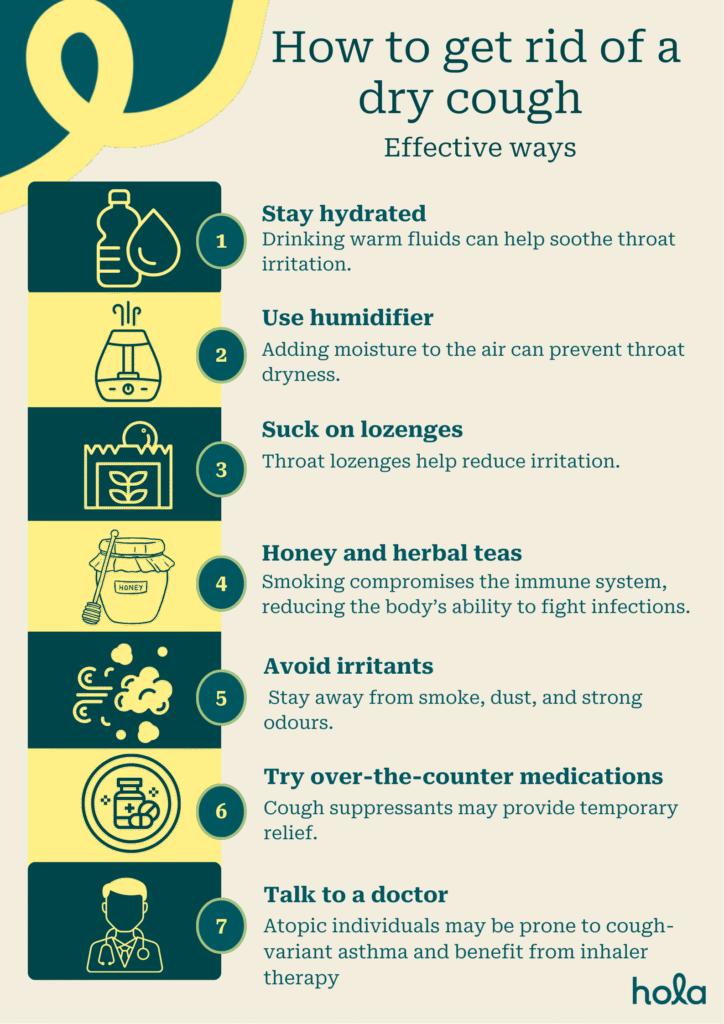Extreme dry cough but not COVID: A doctor’s take
Written by Dr.Gosagan Gopalakrishnan, BSc (Hons), MBChB, DRCOG, MRCGP, FRACGP.

Contents

Introduction
I grew up in London, and my best friend still lives there. I distinctly remember how he used to have asthma and regularly carried a blue puffer to school. Fortunately, he “grew out” of it. Recently, after recovering from COVID-19 and then another viral illness, he was left with an annoying dry cough that flared up whenever he spoke in meetings or on the phone. I suggested it might be his asthma being re-triggered and told him to see a GP. Apparently, his GP laughed at the idea - which got me thinking about this blog.
A persistent dry cough can be both frustrating and worrying, especially when it’s not related to COVID-19. While there are many potential causes, understanding what might be behind it - and how to treat it - can help you find relief. In this guide, we’ll explore common causes of a lingering dry cough, treatment options, and when it’s time to see a doctor.
What causes a dry cough with no other symptoms like COVID?
A dry cough occurs when there is irritation or inflammation in the throat and airways without producing mucus. Some common causes include:- Postnasal drip: Mucus from the nasal passages trickles down the throat, triggering a cough.
- Allergies: Pollen, dust, pet dander, and mould can lead to an ongoing dry cough.
- Acid reflux (GORD): Stomach acid irritating the throat can cause chronic coughing.
- Asthma: Some people experience a form known as cough-variant asthma, where coughing is the primary symptom rather than wheezing. In Australia, Salbutamol (the blue puffer) is available over the counter from pharmacies. However, it’s important to use it with caution - over-reliance can lead to airway remodelling, reducing its effectiveness during a severe, life-threatening asthma attack. If you find yourself regularly needing a blue puffer, it’s essential to speak with your doctor about starting a daily preventer medication to better manage your asthma long term.
- Medications: ACE inhibitors - medications commonly used to manage high blood pressure (typically ending in “-pril”, such as ramipril, captopril, or enalapril) - can cause a persistent dry cough in some people. This side effect is thought to be related to a build-up of bradykinin, a naturally occurring chemical in the body. The cough may take several weeks to resolve even after stopping the medication.
- Environmental irritants: Smoke, pollution, and strong fragrances can trigger coughing.
- Viral infections: Some viruses can cause lingering dry coughs even after the initial infection resolves. Some viruses may exacerbate asthma or trigger cough-variant asthma.
What virus causes a dry cough?
While COVID-19 is a well-known cause of dry cough, other viral infections can also lead to persistent coughing, including:- Common cold viruses (rhinoviruses)
- Influenza (flu) virus
- Respiratory syncytial virus (RSV)
- Adenoviruses
- Parainfluenza viruses
Feeling sick and unsure why? Speak with a GP online in 15 minutes.
What is the difference between a dry cough and a productive cough?
A dry cough is non-productive and does not bring up mucus or phlegm. It often results from irritation or inflammation in the throat or airways. A productive cough, on the other hand, involves the expulsion of mucus, which helps clear the lungs and airways.When to call the doctor
Seek medical advice if:- Your cough lasts longer than four weeks.
- You experience difficulty breathing or chest pain.
- The cough worsens over time instead of improving.
- You cough up blood.
- You have associated symptoms like weight loss, night sweats, or a fever.
- You are bothered by your cough, or it is affecting your work or sleep.
How to get rid of a dry cough
Several remedies can help soothe a dry cough:- Stay hydrated: Drinking warm fluids can help soothe throat irritation.
- Use a humidifier: Adding moisture to the air can prevent throat dryness.
- Suck on lozenges: Throat lozenges help reduce irritation.
- Honey and herbal teas: Natural remedies like honey can coat the throat and reduce coughing.
- Avoid irritants: Stay away from smoke, dust, and strong odours.
- Try over-the-counter medications: Cough suppressants may provide temporary relief.
- Talk to a doctor about trialling medications: Atopic individuals - those with conditions such as eczema, asthma, or hay fever - or anyone with a family history of atopy may be more prone to cough-variant asthma. These patients can benefit from speaking to a doctor
 Also read: Natural home remedies for Dry Cough: Doctor’s Pick
Also read: Natural home remedies for Dry Cough: Doctor’s Pick
Can dry cough be prevented?
You can reduce your risk of developing a dry cough by:- Avoiding allergens and air pollutants.
- Staying hydrated to keep your throat moist.
- Managing acid reflux with dietary and lifestyle changes.
- Using a humidifier, especially in dry environments.
- Getting vaccinated against respiratory infections like the flu.
How long is it OK to have a dry cough?
A mild dry cough from a cold or flu typically resolves within two weeks. However, if a cough lasts longer than three to four weeks or worsens over time, it is advisable to consult a doctor.FAQ
What type of cough is worrying?
A persistent, worsening cough, especially one accompanied by blood, chest pain, or breathing difficulties, should be evaluated by a doctor.What does a GORD cough sound like?
A GORD-related cough is often chronic and occurs after eating or lying down. It may be accompanied by a hoarse voice, throat clearing, or a burning sensation in the chest.Can a telehealth doctor help?
Yes, a telehealth doctor can assess your symptoms, suggest home remedies, prescribe medication if needed, and determine whether further investigations are necessary.How can Hola’s online doctor help via telehealth?
If you have a persistent dry cough, Hola Health’s online doctors can provide expert guidance and treatment options from the comfort of your home.- Instant online doctor consultation: Receive professional advice without visiting a clinic.
- Prescriptions sent electronically: Request instant scripts online for your dry cough.
- Referrals for further testing: If necessary, an online doctor can arrange referrals for additional investigations.
- Medical certificates: If your cough affects your ability to work, a telehealth doctor can provide a medical certificate online.
Need time off to recover? Get your medical certificate online within 15 minutes.
What we treat
- Cough
- Nausea & vomiting
- Fever
- Hayfever
- Fatigue
- Sore throat
- Acne
- Hair loss
- Gout
- Eczema
- Rosacea
- Sunburn
- UTI
- Erectile dysfunction
- Contraception
- Morning sickness
- Morning after pill
- Prostate health
- Anxiety
- Depression
- Stress
- Grief & loss
- Antidepressants
- Premature ejaculation
- Asthma
- Blood pressure
- Blood thinners
- Diabetes
- Cholesterol
- Migraines & headaches
- Allergies
- Body ache
- Heartburn & reflux
- Sleep disorder
- Pain relief
- Gastro
Related Articles
Disclaimer
This blog is for general informational purposes only and does not indicate that Hola Health provides all treatments or preventive measures mentioned. It is not intended to be a substitute for professional medical advice. Always seek the guidance of your doctor or other qualified health professional with any questions you may have regarding your health or a medical condition. For emergencies please immediately contact 000. Any medical topics discussed are intended to educate, not to imply availability through Hola Health.

Get affordable healthcare on your terms, with quick access to qualified, Australian-registered telehealth doctors & health practitioners, 24/7, 365 days a year. No more searching for ‘doctors near me‘ – Hola connects you instantly.
Address: 79 St Georges Terrace, Perth WA 6000


Hola Health App
Get affordable healthcare on your terms, with quick access to qualified, Australian-registered telehealth doctors & health practitioners, 24/7, 365 days a year. No more searching for ‘doctors near me‘ – Hola connects you instantly.
Call 000 for emergency or urgent medical help.
Address: 79 St Georges Terrace, Perth WA 6000
© Hola Health, a brand of Packapill Pvt Ltd


 Facebook
Facebook  X
X  Copy Link
Copy Link











